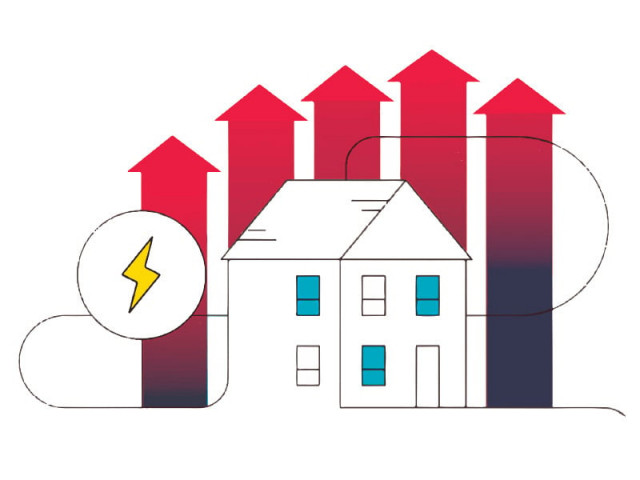Rs1.2tr sought for power subsidies
Energy ministry demands 26% higher allocation despite massive rise in tariffs

Despite phenomenally increasing electricity prices, the Ministry of Energy has sought a colossal Rs1.23 trillion in power subsidies for the next fiscal year, an increase of 26% over the allocation this year.
Funds are sought for mostly covering the difference between consumer prices and generation costs and for subsidies for Azad Jammu and Kashmir (AJK), the erstwhile Federally Administered Tribal Areas (Fata), agricultural tube wells in Balochistan and circular debt reduction plan through a dividend scheme.
The Ministry of Energy’s demand for Rs1.234 trillion in power subsidies for the next fiscal year is 26% higher than the original allocation of Rs976 billion for the current fiscal year.
The demand has been placed for the budget of fiscal year 2024-25, which will be presented in parliament in June this year, according to sources in the energy ministry. The amount is subject to scrutiny by the Ministry of Finance and the International Monetary Fund (IMF).
Pakistan cannot make any major allocation in budget without prior consent of the IMF, if the country is keen to timely sign the Extended Fund Facility. The federal government had to print the budget books twice in June last year after the IMF refused to accept the budget presented in the National Assembly without its consent.
The total demand for Rs1.234 trillion appears on the higher side, as the government has been constantly increasing electricity prices on account of monthly, quarterly and annual tariff adjustments. Prices have hit the roof and consumers are now searching for off-the-grid energy solutions, resulting in a reduction in electricity demand.
During review talks, Pakistan has already agreed with the IMF on a further increase in electricity prices from July and in case of need it stands ready to jack up prices during this fiscal year as well to keep circular debt at the agreed level of Rs2.31 trillion.
An official of the finance ministry said that the demand would be reviewed in the coming days and final allocation would depend on the space available in the budget and the government’s energy policies.
An amount of Rs450 billion has been demanded for direct payment of tariff differential subsidy to consumers of less than 200 units per month – a cost the government pays due to the difference between the cost of generation and selling price. The demanded amount is Rs131 billion, or 41% higher, than the current fiscal year.
Read Domestic consumers bear Rs17b subsidy cost
The government picks only one-third of the subsidies and the rest is forcefully charged from residential, commercial, industrial and CNG consumers.
Out of the Rs450 billion, the consumers of 10 power distribution companies will get Rs276 billion, up Rs126 billion, or 84%. Another Rs174 billion is being sought for K-Electric (KE) consumers, which is higher by Rs5 billion over this year’s budget.
For KE, the Ministry of Energy has sought a total of Rs262 billion, including Rs88 billion for the payment of subsidy arrears of previous years.
The federal government and KE signed various agreements a few months ago to end the dispute over subsidy payments and ensure timely payment of current subsidy.
Sources said that the Ministry of Energy had demanded an allocation of Rs100 billion for clearing the power-sector circular debt under the dividend ploughing back scheme. The interim government had proposed to clear Rs1.27 trillion worth of energy sector debt, including roughly Rs250 billion of the power sector. However, the IMF objected to the proposal.
The energy ministry has demanded a subsidy of Rs65 billion for ex-Fata, which is 67% more than this fiscal year. In addition, it sought Rs86 billion for clearing arrears of ex-Fata consumers.
There are, however, transparency and accuracy-related concerns about electricity subsidy claims for the erstwhile Fata and agricultural consumers of Balochistan.
Since the federally administered areas have been merged with Khyber-Pakhtunkhwa, there is a need to end unlimited power subsidies. The federal government has also been picking up the additional cost to end any disparity in economic development in the area.
The energy ministry has proposed Rs10 billion for the payment of subsidy to agricultural tube wells in Balochistan. The federal government has been paying its share of tube-well subsidy but the Ministry of Energy is unable to create efficiency in the distribution company.
Sources said that during the recent review talks, the IMF objected to the continuation of tube-well subsidy in Balochistan. The government assured the lender that no preferential treatment would be given to any particular set of consumers.
The ministry has sought a staggering Rs108 billion for AJK consumers, who are getting highly subsidised electricity. The claim is Rs83 billion, or 332%, higher than this fiscal year.
The Ministry of Energy has sought a subsidy of Rs40 billion to clear the backlog of the federal government. For this fiscal year, the finance ministry has refused to make these payments.
Subsidies worth Rs215 billion have been demanded to pay dues of private power producers under a three-year-old deal.
The ministry has demanded Rs24 billion for retiring the debt parked in a holding company. Consumers are forced to pay a surcharge of Rs3.23 per unit to bear the cost of interest on this debt.
Published in The Express Tribune, March 28th, 2024.
Like Business on Facebook, follow @TribuneBiz on Twitter to stay informed and join in the conversation.



















COMMENTS
Comments are moderated and generally will be posted if they are on-topic and not abusive.
For more information, please see our Comments FAQ